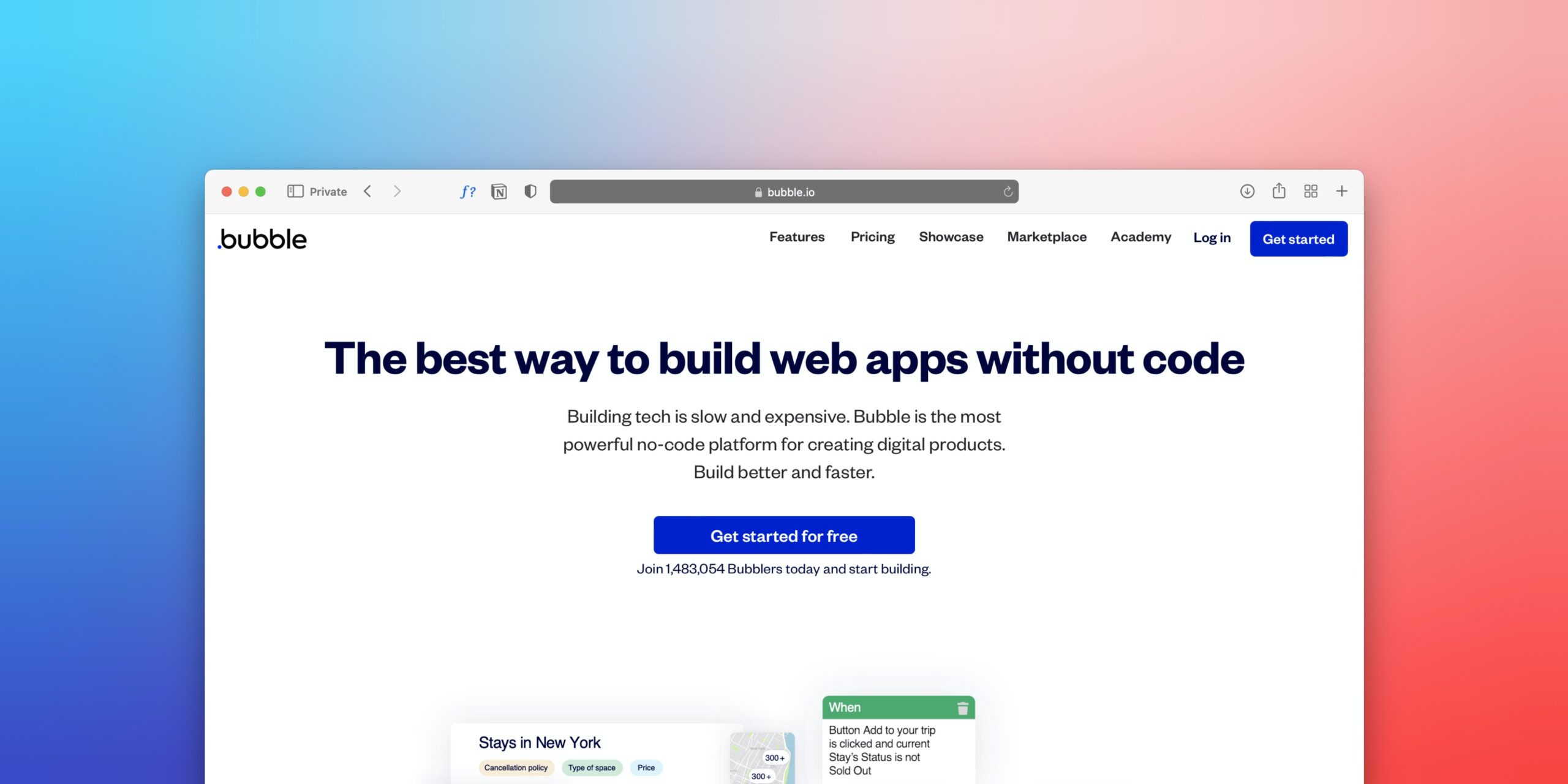In today’s highly competitive business landscape, startups are constantly seeking ways to gain a competitive edge. One avenue that has gained significant attention is no-code app development. This innovative approach allows startups to create powerful and customized applications without the need for extensive coding knowledge or expertise. In this article, we will explore the benefits of no-code app development for startups and why it is worth considering for your business’s growth.
Understanding No-Code App Development
Before delving into the advantages of no-code app development, let’s first define what it entails. No-code app development refers to the process of creating applications using visual interfaces, drag-and-drop functionality, and pre-built components. This approach eliminates the need for traditional coding methods and empowers entrepreneurs to bring their app ideas to life quickly and efficiently.
Defining No-Code App Development
No-code app development platforms leverage a wide range of pre-built components and templates that can be customized to match the unique needs of a startup. These platforms typically provide a visual interface where users can design the app’s layout, add functionalities, and define workflows using a simple drag-and-drop mechanism. This intuitive approach makes app development accessible to individuals without extensive coding knowledge or experience.
One of the key benefits of no-code app development is the ability to rapidly prototype and iterate on app ideas. With traditional coding methods, developers often spend a significant amount of time writing and debugging code. However, with no-code platforms, entrepreneurs can quickly create functional prototypes and gather feedback from users, allowing them to refine their app concept before investing significant time and resources into development.
Furthermore, no-code app development platforms offer a wide range of pre-built components and templates that can be easily customized. This not only saves time but also ensures consistency in the app’s design and user experience. Entrepreneurs can choose from a variety of UI elements, such as buttons, forms, and navigation menus, and customize them to match their brand identity and target audience.
The Rise of No-Code Platforms
The growing popularity of no-code app development can be attributed to the rise of sophisticated and user-friendly platforms. In recent years, various no-code platforms have emerged, each offering unique features and tools to streamline the app development process. These platforms incorporate powerful functionality, such as database integration, third-party API integration, and even artificial intelligence capabilities, making them suitable for startups looking to build robust applications.
One notable advantage of using no-code platforms is the ability to leverage existing integrations and services. These platforms often provide seamless integration with popular services like Stripe for payment processing, Firebase for real-time data synchronization, and SendGrid for email notifications. By utilizing these integrations, entrepreneurs can focus on building the core features of their app without having to reinvent the wheel or spend time integrating with third-party services manually.
Moreover, no-code platforms often provide extensive documentation and support resources, making it easier for entrepreneurs to learn and master the platform. These resources include tutorials, video guides, and community forums where users can ask questions and get help from experienced developers. This support ecosystem ensures that entrepreneurs can overcome any challenges they encounter during the app development process and continue to iterate and improve their app.
In conclusion, no-code app development has revolutionized the way entrepreneurs bring their app ideas to life. By leveraging visual interfaces, drag-and-drop functionality, and pre-built components, individuals without extensive coding knowledge or experience can create functional and visually appealing applications. With the rise of sophisticated no-code platforms, entrepreneurs now have access to powerful tools and integrations that enable them to build robust and scalable applications quickly and efficiently.
Why Startups Should Consider No-Code App Development
Now that we have a basic understanding of no-code app development, let’s dive into the reasons why startups should seriously consider adopting this approach. From cost efficiency to speed and ease of use, the advantages are numerous.
Cost Efficiency of No-Code Development
For startups with limited financial resources, traditional app development can be prohibitively expensive. Hiring skilled developers, investing in infrastructure, and maintaining technical expertise can quickly erode a startup’s capital. No-code app development, on the other hand, significantly reduces costs by eliminating the need for dedicated developers and extensive coding efforts. This cost savings can be redirected towards other critical areas of the business, such as marketing or product development.
Moreover, the cost efficiency of no-code development extends beyond the initial stages. With traditional app development, ongoing maintenance and updates often require the assistance of developers, leading to additional expenses. However, no-code platforms typically offer built-in tools for managing updates and making changes without the need for coding expertise. This allows startups to save not only on development costs but also on long-term maintenance expenses.
Speed and Ease of Use
Time-to-market is crucial for startups aiming to grab market share and gain early adopters. No-code app development dramatically accelerates the app creation process, allowing startups to quickly prototype and iterate their ideas. With the intuitive drag-and-drop interfaces provided by no-code platforms, entrepreneurs can build functional prototypes within hours, rather than weeks or months. This rapid iteration enables startups to gather valuable user feedback and make improvements, ensuring their app aligns with user expectations.
Furthermore, the ease of use offered by no-code app development empowers startups to take control of their app development process. Without the need for extensive coding knowledge, entrepreneurs can become the architects of their own apps, bringing their ideas to life without relying on external developers. This level of autonomy not only saves time but also fosters creativity and innovation, as startups can experiment and iterate on their ideas without being limited by technical constraints.
Additionally, the speed and ease of use of no-code app development allow startups to quickly adapt to market changes and customer demands. In today’s fast-paced business environment, being able to respond swiftly to emerging trends and customer feedback is crucial for staying competitive. No-code platforms enable startups to make changes to their apps in real-time, ensuring they can meet evolving user needs and preferences.
In conclusion, no-code app development offers startups a cost-effective and efficient way to bring their ideas to life. By eliminating the need for extensive coding knowledge and dedicated developers, startups can save on costs and accelerate their time-to-market. The intuitive interfaces and built-in tools provided by no-code platforms empower entrepreneurs to take control of their app development process, fostering creativity and enabling rapid iteration. With these advantages, startups can position themselves for success in the dynamic and competitive app market.
Key Benefits of No-Code App Development for Startups
No-code app development has revolutionized the way startups bring their ideas to life. With its rapid prototyping and deployment capabilities, flexibility and scalability, and reduction in the need for technical expertise, no-code app development has become a game-changer for entrepreneurs. Let’s dive deeper into these key benefits:
Rapid Prototyping and Deployment
One of the most significant advantages of no-code app development is the ability to rapidly prototype and deploy applications. Startups can quickly transform their ideas into functional prototypes, allowing them to demonstrate the app’s value proposition to potential investors or stakeholders. The speed at which prototypes can be created and deployed gives startups a competitive edge, enabling them to iterate and refine their app’s features and functionalities based on valuable user feedback. This iterative approach ensures that the final product meets the needs and expectations of the target audience.
Imagine a startup founder with a brilliant app idea. With traditional coding methods, it would take months, if not years, to develop a fully functional prototype. However, with no-code app development, this process can be accomplished in a matter of days or even hours. The founder can use intuitive drag-and-drop interfaces, pre-built templates, and a wide range of app components to bring their vision to life quickly. This rapid prototyping capability not only saves time but also allows startups to validate their ideas and secure funding faster.
Flexibility and Scalability
No-code app development platforms offer startups the flexibility to adapt their applications to changing market conditions and customer demands. With traditional coding methods, making updates or changes to an application’s codebase can be time-consuming and costly. Developers need to write new code, test it thoroughly, and ensure that it doesn’t break any existing functionality. This process can be a significant bottleneck, especially for startups that need to move quickly.
However, no-code platforms provide startups with a visual interface that allows them to easily modify their app’s features, design, and workflows without writing a single line of code. This agility empowers startups to stay ahead of the competition and pivot their product quickly when needed. Whether it’s adding new features, changing the user interface, or improving the app’s performance, startups can make these modifications with just a few clicks. This flexibility ensures that the app remains relevant and aligned with the evolving needs of the target market.
Furthermore, as startups inevitably grow, scaling their applications becomes streamlined, thanks to the scalability built into no-code app development platforms. These platforms are designed to handle increasing user loads and data volumes without compromising performance. Startups can seamlessly scale their applications to accommodate a growing user base, ensuring a smooth user experience even during periods of high demand. This scalability is crucial for startups aiming to expand their customer base rapidly and capture new market opportunities.
Reducing the Need for Technical Expertise
Technical talent is often scarce and expensive, posing challenges for startups looking to develop sophisticated applications. Hiring dedicated developers or outsourcing development work can be costly, especially for cash-strapped startups in their early stages. No-code app development bridges this talent gap by empowering non-technical founders and entrepreneurs to build fully functional applications without needing to hire dedicated developers.
With no-code platforms, founders can leverage a visual interface and pre-built components to create complex applications without writing code. This democratized approach unleashes the creative potential of founders, enabling them to bring their app ideas to life independently. Startups can save significant costs by eliminating the need for a dedicated development team or expensive freelancers. Instead, they can focus their resources on other critical aspects of their business, such as marketing, sales, and customer acquisition.
Moreover, no-code app development platforms often provide extensive documentation, tutorials, and community support, making it easier for non-technical founders to learn and master the platform. This support system ensures that startups can overcome any initial learning curve and start building their applications with confidence.
In conclusion, no-code app development offers startups a range of benefits, including rapid prototyping and deployment, flexibility and scalability, and a reduction in the need for technical expertise. By leveraging these advantages, startups can accelerate their app development process, adapt to changing market conditions, and bring their innovative ideas to life without the traditional barriers associated with coding. No-code app development has truly democratized the app development landscape, empowering startups to turn their visions into reality.
Potential Drawbacks and Limitations of No-Code App Development
While no-code app development offers significant benefits, it’s important to acknowledge the potential drawbacks and limitations associated with this approach.
Concerns About Customization and Complexity
One potential limitation of no-code app development is the predetermined nature of pre-built components and templates. While these pre-made assets save time and effort, they may restrict the level of customization and uniqueness that some startups desire. Additionally, as application complexity increases, certain functionalities or integrations may not be feasible within the constraints of no-code platforms. Startups should carefully assess their app’s requirements and determine if the limitations of no-code development align with their long-term vision.
Security and Compliance Issues
The security and compliance landscape is of paramount importance for any startup handling sensitive user data or operating within regulated industries. Startups utilizing no-code app development must ensure that their chosen platforms provide robust security measures and compliance with relevant regulations. Additionally, startups should be aware of potential vulnerabilities introduced by third-party integrations and thoroughly scrutinize the security practices of these providers.
Choosing the Right No-Code Platform for Your Startup
When considering no-code app development for your startup, choosing the right platform is crucial to its success. Various factors should be taken into account before committing to a specific platform.
Factors to Consider
Start by evaluating the platform’s features and functionality, ensuring it aligns with your app’s requirements. Look for pre-built components and templates that can accelerate development and enable flexibility. Consider the platform’s ease of use and the learning curve for your team members. Robust customer support and a thriving user community can also be indicators of a reliable platform. Finally, a cost analysis should be performed to ensure the platform’s pricing aligns with your startup’s budgetary constraints.
Popular No-Code Platforms for Startups
Some widely used no-code platforms for startups include Bubble, Adalo, and OutSystems. Each platform offers unique features and caters to different use cases. Bubble is an excellent choice for startups looking for extensive customization options and scalability. Adalo, on the other hand, specializes in creating mobile apps quickly and efficiently. OutSystems stands out with its enterprise-grade capabilities, making it ideal for startups with complex application requirements and scalability needs.
In conclusion, no-code app development presents startups with a powerful opportunity to create custom applications without the need for extensive coding knowledge or resources. The cost efficiency, speed of development, and flexibility are key advantages that can fuel a startup’s growth. While there are potential limitations and considerations, carefully choosing the right no-code platform can help startups unlock their full potential and bring their ideas to life seamlessly in the app market.
Image by Team Nocoloco on Unsplash




